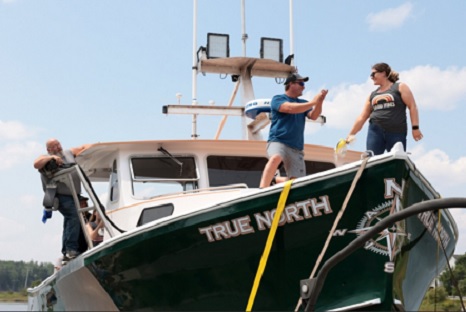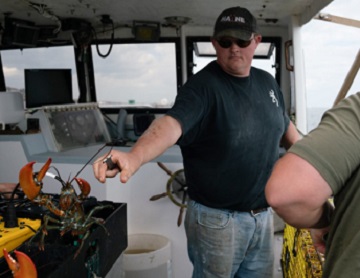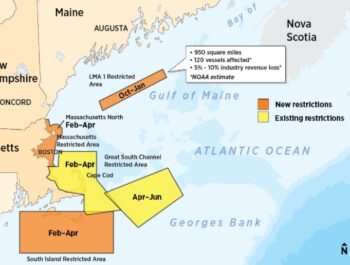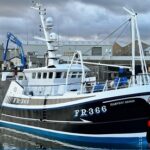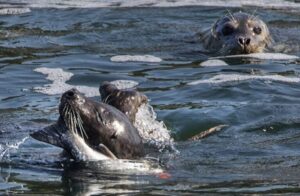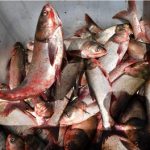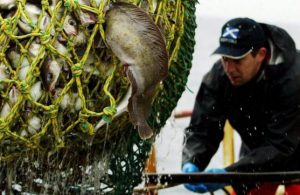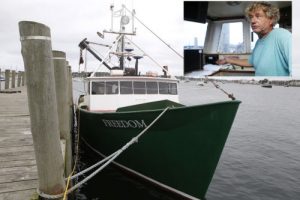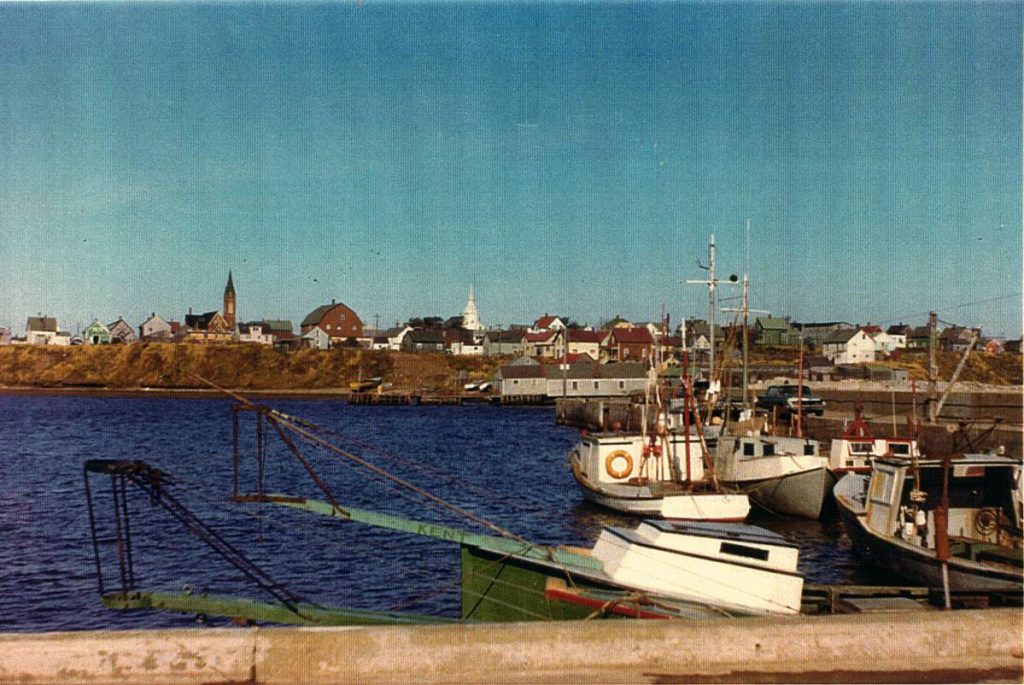Tag Archives: lobstermen
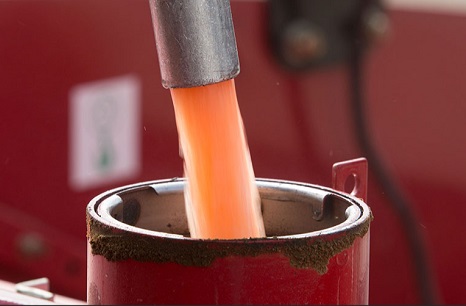
Commercial fishermen dealing with off the chart fuel prices
The fuel prices are also affecting prices out at sea. Many commercial fishermen use diesel, which is now running well over 6 dollars a gallon. Captain James Keding has been running Mary K, named after his mother, for 38 years. He says his mussel harvesting operation is taking a huge hit from fuel prices. “Back in 2019, I paid $1.50 a gallon, now I’m paying $6.50 a gallon,” said Keding. Lobstermen are also in a pinch. Captain Dave Hobson says the Right Whale restrictions were just lifted so everyone in his line of work is trying to run their traps out with the higher fuel costs. >click to read< 07:53 Video, Rising diesel prices having big impact on commercial fishermen, >click to watch<

Need for legal defense fund spotlights failures of federal lobster management
The Legislature’s recent passage of LD 1916, An Act to Create a Legal Defense Fund for the Maine Lobster Industry, shows a clear move by the state to protect its lobstermen from assumed federal government oversight. LD 1916, sponsored by Rep. Billy Bob Faulkingham, R-Winter Harbor, allocates money from an existing lobster license surcharge to help fund the legal battle against these tough regulations in the courtroom. Lobstermen have argued that the regulations aimed at protecting right whales are unfounded and not science-based. Some have argued that a right whale has not been found in the waters that have been closed off by NOAA since 2010. >click to read< 10:46
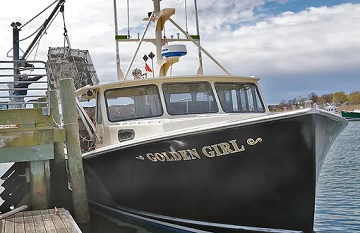
Massachusetts state lobster closure extended
As has become an annual tradition, the state’s yearly fishing closure to protect right whales has been extended until mid-May, cutting short a season already slashed in the name of species protection. The state sent out a notice to lobstermen Friday that the closure for 9,000 square miles of water, tentatively set to end May 1, would be extended through May 15 due to the presence of whales off the coast and near the Cape. For now, Massachusetts lobstermen are restricted to fishing in federal waters, where the season started at midnight Sunday, May 1. >click to read< 11:12
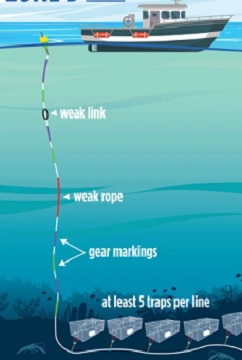
Big Story: Lobstermen fear disaster as new gear regulations take effect
Doug McLennan isn’t worried about the state of the fishery. What worries McLennan and thousands of other Maine lobstermen is the latest round of federal regulations designed to protect the endangered North Atlantic right whale, and additional measures being planned for the next decade. The newest regulations took effect Sunday, though their enforcement has been delayed until supply chain issues for some of the required gear are resolved. This is just the latest in gear regulation change required by the Atlantic Large Whale Take Reduction Plan,,, Many lobstermen have raised concerns about safety and the potential for gear failure and loss of expensive traps under the new rules, and they worry about what is coming next. >click to read< 09:16
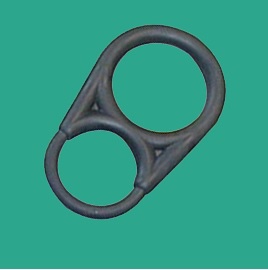
Dealers scramble to supply lobstermen ahead of gear-change deadline
May 1 is the deadline for commercial lobstermen in Maine to trawl up, use weaker rope or insert weak links, and mark gear with the state color purple. But will they be ready? “Everyone’s hoping for a good year, hoping for a good price,” said Virginia Olsen, a Maine Lobstering Union Local 207 member who fishes out of Stonington. “We’re just going to do what we do. We’re gonna go to work.” But first, enough rope and weak links must come into local fishing gear stores to supply the approximately 4,500 commercial lobstermen in Maine, each of whom can haul up to 800 traps. >click to read< 13:26
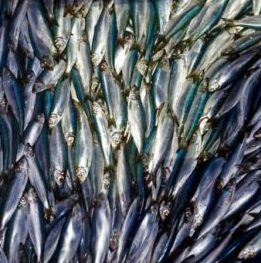
Bait Crisis: Lobstermen worry fishery closures will create bait supply issues
Last week, Fisheries and Oceans Canada shut down commercial harvesting of herring in the Gulf of St. Lawrence and Atlantic mackerel in Atlantic Canada and Quebec amid dwindling stocks. The two species are important sources of bait for the lobster industry. Some Island fishermen say they were caught off guard by the announcement as they prepare for setting day about a month from now. “It’s tough on fishermen because … we need the bait to fish lobster,” said Mallory Harris, who fishes in North Lake. Other fishermen said they’re already seeing the price of bait for lobster traps increase. >click to read< 08:14
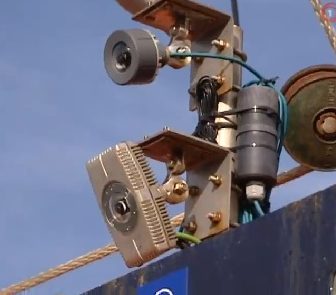
Lobstermen who harvest federal waters will be required to install electronic trackers
East Coast lobster and Jonah Crab fishermen who harvest federal waters will be required to install electronic trackers on their boats, giving federal regulators unprecedented detail on where fishing activity is taking place. A vote by the regional American Lobster Management Board approved the measure Thursday. Ware and the co-chair of the Maine Legislature’s Marine Resources Committee, Democratic Senator David Mirament, voted for the measure, over objections from the third member of Maine’s delegation, lobsterman Steve Train. >click to read< 09:32
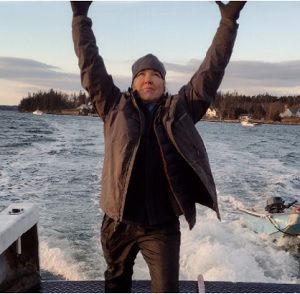
Maine seafood harvesters are taking on an unexpected new hobby
Lobstermen repeatedly haul unwieldy traps, oyster farmers bend over to pull up hulking cages and scallopers hunch over to shuck their prized shellfish at sea. Harvesting seafood for a living can exact a stiff toll on the lower back. The industry has long had a reputation for a “rub some dirt on it” mentality when it comes to these and other daily aches and pains, but a new program aims to introduce fishermen to yoga to keep them on their feet and out on the water. >click to read< 12:26
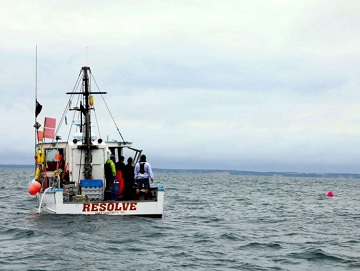
Despite threats from fellow fishermen, Mass lobstermen press to allow ropeless fishing in closed areas
The lobstermen viewed themselves as trailblazers, even calling themselves “Pioneers for a Thoughtful Coexistence”. In an effort to prove that there’s a way for their industry to resume fishing in coastal waters where Massachusetts banned lobstering to protect endangered whales, they have asked regulators to allow them to set their traps without vertical buoy lines. “I’ve been trying my best to get our guy’s back fishing,” said Michael Lane, 46, a lobsterman who fishes 800 traps out of Cohasset. But when Lane’s group presented at a recent public hearing their proposal to fish with experimental rope less gear, which would use remotely triggered inflatable balloons or other devices to surface the traps, they were pilloried by their fellow fishermen. >click to read< 19:20
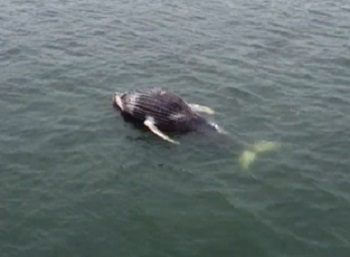
COVID-19 saves right whales by sinking cruise ships
Canada created the Shediac ship restricted zone in April 2020 just a couple weeks before Holland America’s Zaandam was scheduled to sail through that zone on a shipping lane used only seasonally by cruise ships as a shortcut to Quebec City. However, a COVID-19 no-sail order in March 2020 superseded that restriction. Consequently, there was not one Canadian ship right whale strike death in two years and only one Canadian crab entanglement death,,, Zero whales were killed by lobster gear. There has not been one death from lobster gear in the U.S. and only a couple in Canada in over 20 years but the Center for Biological Diversity, with no supporting data, claims the whales are going extinct based on lobster entanglements. >click to read< By Jim O’Connell 07:31

Maine: Lobstermen could soon face another new gear regulation
Patrick Keliher, Commissioner of the state’s Department of Marine Resources, says recent research shows that the number of juvenile lobster floating in the water column or settling to the bottom is declining for a third year in a row. Now Keliher says that lobstermen should also consider another new rule to create a “trigger” mechanism for reducing the catch of juvenile lobster when their abundance falls below a certain level. Patrice McCarron, executive director of the Maine Lobstermen’s Association, on Tuesday told members of the Atlantic States Marine Fisheries Commission that fishermen will be “in shock” when they learn about the potential new rule. >click to read< 07:01

Supreme Court denies lobstermen’s bid to halt Gulf of Maine fishing restrictions
The Supreme Court on Friday denied a request by lobster fishers to halt environmental protections that restrict fishing in a large swath of the Gulf of Maine. The application, filed earlier this week by a lobster fishers’ union and two lobster fishing companies, was rejected without comment by Justice Stephen Breyer, who handles emergency matters arising from the region. >click to read< 13:13

Lobstermen ask Supreme Court to halt restrictions meant to protect whales
The protections in question restrict the use of lobster traps in nearly 1,000 square miles in the Gulf of Maine between October and January. They are intended to protect the North Atlantic right whale,,, In the emergency application, the union and fishing companies said the restrictions would curtail fishing by more than 100 of the state’s “largest and most productive” boats, many of which only fish in the restricted area. “These fishermen and their communities have no other means to make a living except by fishing in these waters during this specific time of year, and even the loss of one season will see their vessels repossessed and their gear obsolete due to changing regulations with no funds to update them,” the application states. >click to read< 13:16 Lobstering union petitions U.S. Supreme Court to overturn Gulf of Maine closure – The Maine Lobstering Union has filed a petition asking to plead its case before the U.S. Supreme Court in an effort to reopen the area, which is slated to be closed through January – and every subsequent October through January – in an effort to protect the critically endangered North Atlantic right whale. >click to read< 17:20
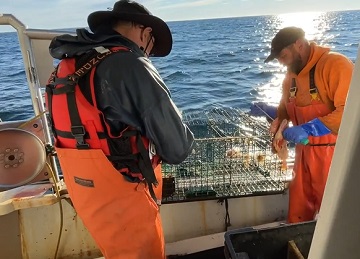
Maine Lobstering: A Family Business Facing Challenges
“Today, we really face multiple challenges including competition for the bottom fishing ground with plans to erect windmill generators, to huge increases in the price of bait due to limiting the Herring catches. Just getting new buoys made is tough,” said Capt. Steve Train, a lobsterman of Long Island, Maine. “There is a year-long wait for new traps because there aren’t a lot of people building them. And there is the closing of the federal offshore fishing grounds with the implementation of new regulations as part of the 1973 Endangered Species Act. All these challenges are driving our costs up.” West Bath, Maine Capt. Peter Doran agrees the industry has always faced challenges. photos, video >click to read< 19:04
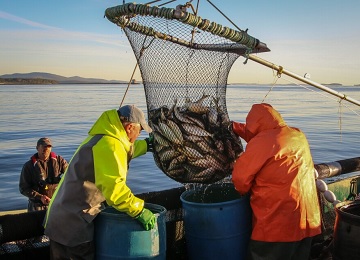
Pogies are back in Maine, and lobstermen say they’re more valuable than ever
Lobstering in Maine requires lots of bait, but Atlantic herring, a favored bait, are in short supply. Over the past few years, rebounding menhaden have been taking up the slack. Jamie Steeves, the lobster dealer who owns the boat the crew uses to catch the pogies, will sell the fish to lobstermen from the dock. “Let’s put it this way. If we weren’t catching pogies, and I say we as a whole, the industry, all my friends, those around us, if we weren’t catching them, this industry as lobstering would be in a lot of trouble,,, photos, video, >click to read< 16:53
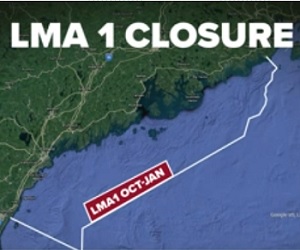
Last ditch effort? MLU gets legislative backing for court fight over Right Whale closure
In some of Maine’s biggest lobster harbors such as Stonington and Deer Isle, the closure of nearly 1,000 square miles of fishing territory is a big worry. In some of Maine’s biggest lobster harbors such as Stonington and Deer Isle, the closure of nearly 1,000 square miles of fishing territory is a big worry. Virginia Olsen fishes there and is also a leader of the Maine Lobstering Union.,, The lobstering union is going to federal court next Friday, hoping to get a temporary restraining order to stop the closure.,,, In advance of that hearing, the Maine Legislature is getting involved. >Video, click to read< 13:35
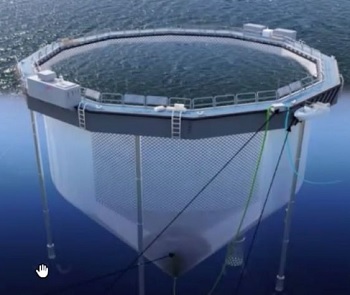
If the Frenchman Bay salmon farm isn’t right for Norway, it’s not right for Maine
About that American Aquafarms proposal: NIMBY- not in my backyard. In this case it applies to the developer, not the opponents. Whenever I describe to people the location of this industrial development in Frenchman Bay, their first reaction is always the same: What were they thinking? How could they possibly do this? The short answer is, the developers came here to do what they couldn’t do back home in Norway. They couldn’t build this project in their own backyard, so they are trying to put it in our front yard,, We’re better than this, and it’s time we stand up for all that is special about the Maine coast and say no. Not here. Not now. Not ever. >click to read< By Jerry Potter 10:55

Challenges abound, but lobstermen say they’re in it for the long haul
Around 2 a.m. each morning, a parade of trucks from around the region begins the journey down to the Stonington docks, marking the start of another day of lobstering in Maine. In short, a large part of coastal Hancock County and beyond depend on lobster. One of the locals that has made her living off lobster is Julie Eaton, a member of Stonington’s 300-plus lobster boat fleet. She’s been at it for 39 years now and to her it’s not just a job, it’s a way of life. Every fisherman has their own story, but almost all of them say they got into the business because they love working on the ocean. 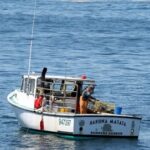 For the hundreds of lobstermen in the region, things are going pretty well at the moment, even with the pandemic. While things are going well, if you talk to almost any Downeast lobstermen about the future of their industry, the conversation will come to two things: right whales and wind turbines. >click to read< 13:28
For the hundreds of lobstermen in the region, things are going pretty well at the moment, even with the pandemic. While things are going well, if you talk to almost any Downeast lobstermen about the future of their industry, the conversation will come to two things: right whales and wind turbines. >click to read< 13:28

Lobstermen are opposed to this. Stopping American Aquafarms is your fight, too
The project will include 30 in-water fish pens, 150 feet in diameter; dozens of generators to power pumps and lights day and night; barges for feed and waste, and vessels ranging in size from 50 to 150 feet to process the fish and haul fish waste, fish food and thousands of gallons of diesel fuel. The threat to the bay’s waters and ecosystem from water pollution, fish escapes and disease is alarmingly real. Lobstermen who have fished these waters for generations also are opposed to this project. All 26 lobstermen who fish out of Bar Harbor presented a statement of opposition to the Town Council recently, and fishermen from around the bay are following suit. By Dennis Damon, >click to read< 11:19
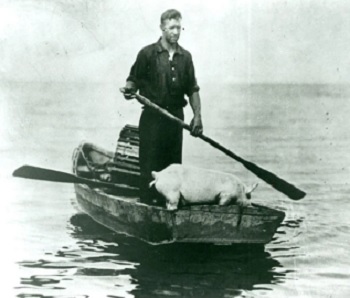
How lobster fishing began in southern Maine
“Until the twentieth century lobsters could be pulled out from under the rocks,” the preservation society said. “The smaller ones of two pounds or less were often thrown away. Men in a variety of boats, dories, peapods and recently the easily recognized lobster boats powered by motors, set traps along the ledges. Increasing numbers of pots have been attached on a line to a buoy on which each man’s colors can be identified. Most lobstermen spent the winter months making traps, painting buoys and knitting bait bags. Lobstering was usually done in the summer when lobsters moved into warmer waters.” photos, >click to read< 21:37

Lobstermen And Conservationists To Closely Watch Right Whale Court Case
Conservationists and fishermen will be closely watching a federal court case closely over the next 12 days. “Arguably, the existence of the Massachusetts lobster fishery is at stake today,” The case is being pushed by activist Max Strahan, who wants a judge to ban Massachusetts from authorizing fisheries that use vertical ropes that can entangle and kill North Atlantic right whales. >click to read< 08:07
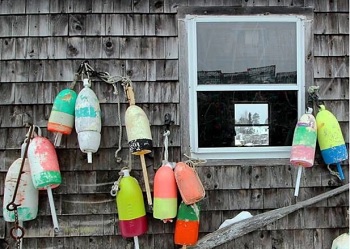
Lobstermen Protest Offshore Wind Farm in the Gulf of Maine
An ambitious wind power project in the Gulf of Maine could, years from now, make these family lobster dinners less frequent. Local lobstermen believe offshore wind will significantly disrupt the ecosystem and displace fishermen. Supporters say a project will provide clean energy for the region.,, “When you think of Maine, lobster’s the first thing that comes to mind,” Dustin Delano, a fourth-generation lobsterman and the Vice President of the Maine Lobstermen’s Association, told me a story about fishermen from the United Kingdom coming to Maine a few years ago to discuss the windmill arrays which had been recently installed where they fish. One Mainer asked, “What would you do if you were us right now?” An English fisherman leaned over the table and said, “Fight it with everything you have, because you have everything to lose and absolutely nothing to gain.” >click to read< 17:04
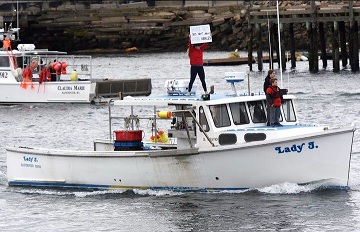
Parading in protest – Lobstermen call for abolishment of closures
About 40 lobster boats participated Wednesday in the boat parade protesting Massachusetts’ current closure of virtually all of its state waters to commercial lobstering as a protection for the North Atlantic right whales. The boats, which primarily hailed from Gloucester, Manchester and Rockport, staged around Ten Pound Island in the late afternoon and then headed in single file toward the head of the harbor. Nancy MacDowell of Rockport was at the state fish pier to support her lobstering family in its effort to bring awareness to the closure and the negative impact its is having on those who lobster in state waters. photos, >click to read< 09:05
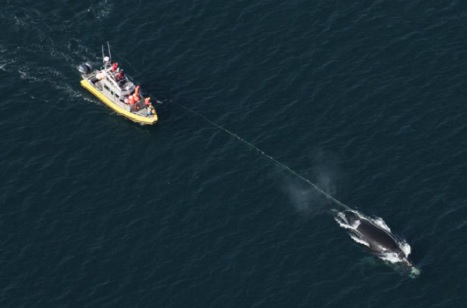
#ShowUsTheRope – Blamed for Right Whale Entanglements, Lobstermen say Show us the rope!
Snow Cone has triggered an outcry of frustration from fishermen, who say they’re being unfairly blamed for the decline of the critically endangered species. On Wednesday, March 10, a team from Provincetown’s Center for Coastal Studies freed Snow Cone from 300 feet of rope. The center described the team’s success on its Facebook page, and used a photo from an aerial survey that shows the whale and the telltale rope from 1,000 feet in the air. “So, I remember seeing this,” said Nick Muto. The Facebook post said the retrieved rope likely came from a fishery, but there was no close-up picture. “So my hashtag, #ShowUsTheRope, is me trying to lay it right on the Center for Coastal Studies,” >click to read< 20:06
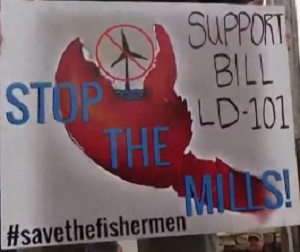
Lobstermen united against Monhegan offshore wind project
In one of Maine’s biggest lobster harbors, close to 100 fishermen and their supporters packed the town dock to stand, side by side, in opposition to offshore wind power development in the Gulf of Maine. For the fishermen, the events of the week have hardened their resolve to fight the wind turbine project, which they say will be just the beginning of more platforms being installed in years ahead. They insist the development will damage the Gulf of Maine, “It’s not about anti-wind, it’s not about anti-green,” said Friendship wharf owner Jim Wotton. “It’s about preserving the Gulf of Maine.” Video, >click to read< 12:21
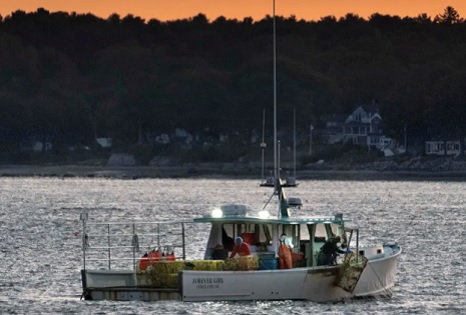
The Intense, Lobster-Fueled Fight Over America’s First Floating Wind Farm
On Sunday, local Maine outlets reported that a slew of fishing boats gathered in a show of protest against a planned wind project in midcoast Maine. While the weekend flotilla of fishermen was peaceful, tensions continued to rise on Monday. That’s when the wind project’s owners accused three fishing boats of intentionally surrounding a research vessel that was out for an ocean floor survey, “creating an unsafe situation” that forced them to suspend operations,,, >click to read< 09:55
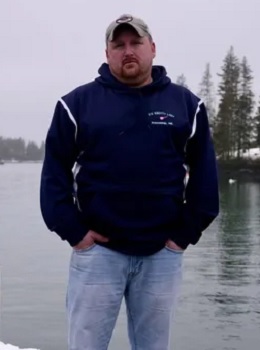
Maine lobstermen protest Monhegan-area wind project
More than 80 lobster boats lined up between Monhegan Island and Boothbay Harbor on Sunday to protest a seabed survey for a planned offshore wind turbine near Monhegan. “The boat hasn’t been staying in the survey route, and there’s been some issues with gear loss,” Dustin Delano, a lobsterman from Friendship who helped organize the protest, said this weekend. Delano estimated that more than 80 boats joined him around 9 a.m. Sunday south of Monhegan Island, where a 12-megawatt test turbine billed as the first commercial-scale project in the nation would demonstrate the  viability of offshore wind as a renewable power source. The fishermen formed a single-file line that Delano said stretched roughly 2 miles, and then traced the route back to land. >click to read< 07:05
viability of offshore wind as a renewable power source. The fishermen formed a single-file line that Delano said stretched roughly 2 miles, and then traced the route back to land. >click to read< 07:05
Dozens of lobster boats gather off Monhegan to protest floating wind turbine – Gov. Janet Mills is proposing to build more of the floating wind turbines farther offshore in the Gulf of Maine. video, >click to read<






